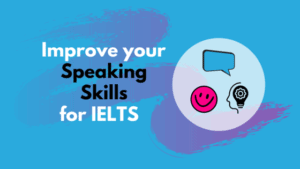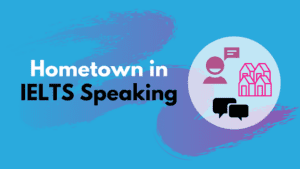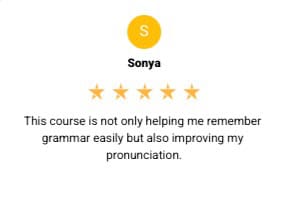10 Advanced Phrasal Verbs to Understand Native English Speakers
👇 Take this lesson with you! 👇
Table of Contents
If you want to understand native English speakers you must know phrasal verbs because we use them a lot in spoken conversations. In this lesson, I will show you 10 advanced phrasal verbs that you can use for many topics.
If you’re preparing for your IELTS speaking test these 10 advanced phrasal verbs might help you stand out from the crowd.
What is a phrasal verb?
A phrasal verb is a verb plus a preposition or an adverb particle; or sometimes even two. For example,
- To switch off (the light) = to make it stop working
Sometimes phrasal verbs can be idiomatic.
- To turn up = to appear
I’m glad you turned up today!
10 advanced Phrasal Verbs about work
#1 To drum into
To drum [something] into [someone]= to teach something persistently until it’s remembered.
Our boss always drums the importance of deadlines into our team; but we still miss them.
#2 To stir up
To stir [something] up = to cause a problem to grow.
My colleague Jim likes to stir things up in meetings, often he says things that he knows people will disagree with.
#3 To settle down
To settle down = to become calmer, to calm down
It’s been busy at work, but things are settling down now.
#4 To crack up
To crack up = to laugh uncontrollably
To crack [someone] up = to make them laugh uncontrollably
My boss is so funny, he cracks me up.
#5 To stand in for
To stand in for [someone] = to replace someone temporarily
Jack is off work today, so I am standing in for him.

#6 To fend for [yourself]
To fend for yourself = to take care of yourself
After I became a freelancer, I had to fend for myself; finding clients and negotiating contracts.
#7 To delve into
To delve into [something] = to examine and find more information.
I know these reports are important, so I will delve into them as soon as I can.
I can’t wait to delve into my new book.
#8 To dive into
To dive into [something] = to start doing something with energy
I’m going to dive into my new book, after this video.
After the meeting, we immediately dived into developing the strategy for the upcoming campaign.
#9 To reckon on
I reckon (informal) = I think
To reckon on [something] = to feel something is likely and so make plans depending on that.
We are having a party after the meeting and we are reckoning on about 50 people coming – so make sure there are enough snacks.
We didn’t reckon on this product being so popular; we need to produce more.
#10 To drift off
To drift = to move slowly (often on water)
To drift off = to fall asleep (usually unintentionally).
The meeting was so boring I began to drift off
A story about Work with these 10 Phrasal Verbs
Sophie’s Big Break

Sophie had just started a new job at a marketing company. She was nervous but excited. On her second day, her manager asked her to stand in for Tim, who was on vacation. Sophie wasn’t sure if she could handle the responsibility, but she accepted.
At first, it was difficult to manage all of Tim’s tasks, but after a few days, things began to settle down. The office was busy, but she learned how to keep things under control. Her colleagues were very supportive, and they helped her when she felt overwhelmed.
One day during a team meeting, someone told a funny story about a client, and everyone started to crack up. Sophie laughed so hard that she almost cried. It was nice to see the team having fun together, even when work was stressful.
After the meeting, the team had to dive into a new project. Sophie felt a bit lost at first, and quickly realised that there was a lot of data to go through, so she needed to work overtime to delve into the reports so she could understand everything.
As the project deadline approached, Sophie had to work long hours and sometimes she’d drift off at her desk, she was so tired. It wasn’t easy fending for herself now Tim wasn’t there to help her. It was challenging, but she managed to get everything done on time. However, the project had stirred up some confusion among the clients, and Sophie had to explain things again and again.
Her manager was very patient and kept repeating the same instructions to Sophie and the team. “I need to drum this into you,” he said. “with every new project, we must follow the operating procedures and branding guidelines, otherwise clients get confused.” Sophie listened carefully and made sure to follow every detail.
At the end of two weeks, Tom hadn’t come back to work. He had decided to go and work for himself – as a ski instructor! Sophie was quickly promoted and took over his job, as she had done such a good job during bis absence.
How to Learn Phrasal Verbs
The reason I share this story with you is really simple. When you learn you vocabulary, including phrasal verbs, you have to see the words in several contexts to really learn how and when to use it.
That’s why quite a few of my online courses, such as the IELTS Speaking Gold course and The Vocabulary Vault use stories to help students review and learn vocabulary more deeply so they don’t forget it.
So to learn phrasal verbs effectively, I suggest you learn them one by one in the context you see them. Always check the meaning in a dictionary to see if it is idiomatic or not. Also check if they are separable or not. You can see a fuller explanation of separable and non-separable phrasal verbs in this lesson.
Most of all, don’t get overwhelmed with the large number of phrasal verbs in English. Just learn them one by one, and be curious when you see a new one, be like a detective discovering what it all means.
Finally, enjoy your learning, and slowly over time and with practice, you will master them.

Improve your Speaking Skills with this Free Course
Crack IELTS Speaking Part 1
Learn to Speak with Confidence in Part 1 of Your IELTS Test!
⭐️⭐️⭐️⭐️⭐️
‘It’s such a great course. I’ve learned so many usages for speaking part 1.’
Zu Htet






1 thoughts on “10 Advanced Phrasal Verbs to Understand Native English Speakers ”
Your insights and detailed explanations really helped deepen my understanding of this topic. Looking forward to more content like this.